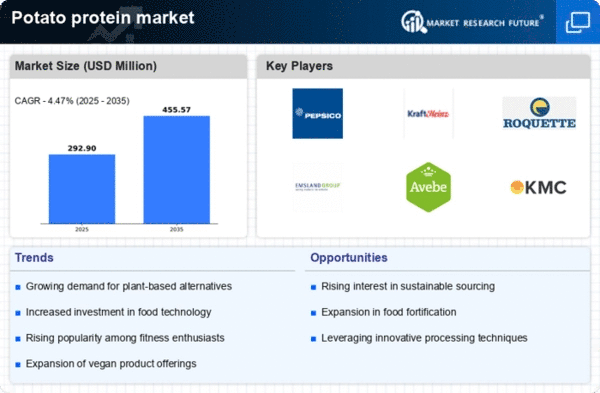Top Industry Leaders in the Potato protein market

The Potato Protein market has experienced substantial growth, driven by increasing consumer demand for plant-based protein sources and a rising awareness of sustainable food alternatives. This analysis delves into the competitive landscape, providing insights into key players, strategies employed, factors influencing market share, emerging companies, industry trends, current investment patterns, and a significant development in 2023.
Key Players:
Coöperatie AVEBE U.A. (Netherlands)
Tereos S.A. (France)
The Agrana Group (Austria)
Roquette Frères (France)
Omega Protein Corporation (US)
Pepees Group (Poland)
Emsland Group (Germany)
Meelunie B.V. (Netherlands)
KMC a.m.b.a. (Denmark)
Südstärke GmbH (Germany)
Strategies Adopted:
The Potato Protein market deploy various strategies to gain and maintain their competitive edge. Strategies encompass product diversification, innovation, acquisitions, and strategic collaborations. For instance, Avebe U.A. has focused on developing innovative potato protein-based ingredients, catering to the evolving needs of the food and beverage industry. Such strategies underline the commitment to staying ahead in innovation and addressing changing consumer preferences.
Market Share Analysis:
The Potato Protein market considers multiple factors that influence competitive positions. These include the protein content and quality of potato protein products, pricing strategies, supply chain efficiency, marketing effectiveness, and responsiveness to market trends. Companies that effectively balance these factors are better positioned to capture and expand their market share. Additionally, adherence to quality standards, regulatory compliance, and sustainability practices contribute to market differentiation.
News & Emerging Companies:
The Potato Protein market has seen the emergence of new and innovative companies looking to capitalize on the increasing demand for alternative protein sources. In 2023, companies like Potato Protein Innovations entered the market, focusing on novel extraction methods and sustainable sourcing practices. These emerging players contribute to market dynamism, fostering innovation and potential disruptions to traditional market dynamics.
Industry Trends:
The Potato Protein market revolve around sustainability, technology advancements, and expanding applications. Key players are investing in research and development to enhance extraction processes, improve functionality, and explore new applications for potato protein, such as in plant-based meat alternatives and nutritional supplements. Additionally, investments in sustainable and transparent supply chains align with the growing consumer preference for eco-friendly products.
Current investment trends highlight the importance of expanding product portfolios and strengthening global presence. Companies strategically acquire or collaborate with regional players to diversify offerings and solidify their positions in key markets. These investments aim to align with evolving dietary trends and diversify applications for potato protein, contributing to sustained growth in the global Potato Protein market.
Competitive Scenario:
The Potato Protein market is characterized by a focus on innovation, sustainability, and responsiveness to changing consumer preferences. Companies differentiate themselves through product quality, marketing effectiveness, and the ability to address the increasing demand for plant-based protein solutions. The market is influenced by factors such as global distribution capabilities, production efficiency, and the versatility of potato protein for various applications in the food and beverage industry.
Recent Development
The Potato Protein market in 2023 was Roquette Frères' strategic partnership with a leading plant-based food company. The collaboration aimed to co-develop a range of innovative plant-based meat substitutes using Roquette's advanced potato protein isolates. This development showcased the industry's recognition of the growing demand for plant-based alternatives and the role of potato protein in enhancing the quality of meat substitutes.
Roquette Frères' collaboration highlighted the importance of partnerships in driving innovation and meeting consumer expectations for high-quality plant-based products. The move positioned Roquette Frères as a key player in the plant-based protein segment, emphasizing its commitment to addressing the changing dynamics of the food industry. This development underscored the broader trend of established companies forming strategic alliances to capitalize on the growing market for alternative protein sources.











